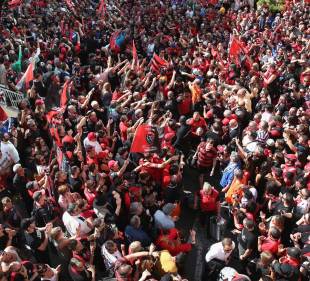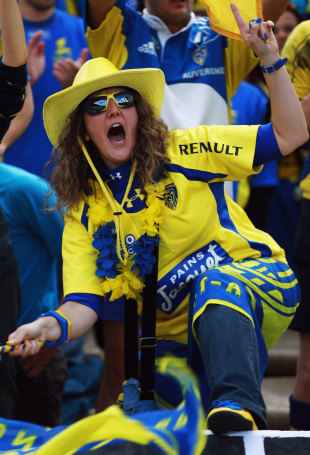|
European rugby
Game, set and Euro match
John Taylor
April 14, 2014

Euro appeal .. Toulon are welcomed to the stadium by their supporters before their recent quarter-final
© Getty Images
Enlarge
So, the European Rugby Champions Cup is now a reality and Premiership Rugby Limited (PRL) has achieved just about everything it promised for the English clubs two years ago. I sat on the Board of PRL through the 2012-13 season and this is exactly what Mark McCafferty, the CEO, was aiming for. He is not everybody's cup of tea (certainly not mine when he tried to block London Welsh's promotion to the Aviva Premiership on very spurious grounds) but credit given where credit is due, he has delivered in spades despite the sometimes wavering support of the French clubs. It is a huge triumph that, finally, enshrines the rights of the clubs and regions, that were set-up as separate businesses when the game became professional in 1995, to run their own competitions and commercial affairs under the governance of the various national Unions and will change the dynamics of that relationship irrevocably. Last weekend saw the Heineken Cup at its best - two great quarter-finals, full stadia, drama everywhere. It always delivers when you get to the knockout stages but the pool stages had been largely disappointing and everybody other than the previous governing body (ERC) knew it needed a shake-up. It had, after all, been put together in haste when the game became professional and, not surprisingly, trying to satisfy everybody resulted in something of a dog's breakfast. Representatives of the six major European nations had done their best but they were looking back not forward to a brand new professional era. Part of the problem was that this was unashamedly designed to be inclusive, to keep everybody together and encourage Italy at the expense of any real meritocracy. That was the real bone of contention for the English and French clubs. They are playing in highly competitive leagues where they have to finish in the top six to guarantee themselves a place at the highly lucrative top table. In contrast, from the Pro 12 (the old Celtic League plus a couple of Italian clubs), three Irish provinces and three Welsh regions were guaranteed a place alongside both Scotland's professional franchises, Edinburgh and Glasgow. Even harder to swallow was the automatic inclusion of two Italian clubs who were always the whipping boys and skewed the whole qualification process. The title of the new tournament, 'The European Rugby Champions Cup' announces its credentials. This will be a tournament for the top teams in Europe - there is one caveat, every country is guaranteed one place (a compromise everybody can agree to) but there are no nominated teams, so everybody has to fight for qualification. A side effect will be that the Pro 12 League will be a much better competition as a consequence! Equally important is the reduction from 24 teams to 20 in the top echelon. There will be four pools of five with the top two in each group qualifying for the knockout stage instead of the ludicrous 'best losers' concept deciding the final three places in the last eight. In year one there will be seven clubs from the Pro 12 League and the top six from the Aviva Premiership and the Top 14 plus the winners of a play-off between the seventh placed side in the English and French leagues. Going forward it would be good idea to give that place to the winner of the second division tournament, The European Rugby Challenge Cup. That should prevent it becoming the equivalent of football's Europa League - a tournament that nobody wants to play in. The Amlin Cup, the current equivalent, means nothing to the participating clubs and most field second-string teams which defeats the whole object of the exercise.

The new European structure should build on the successes of the current one without the baggage
© Getty Images
Enlarge
Because of our squad limitations (caused by our late promotion and budget restrictions) last season which meant we had to rest key players if we were to stand any chance of survival, London Welsh took a reluctant decision to field weakened teams but we were amazed to discover that clubs such as Stade Francais were doing the same. The fans soon cottoned on and voted by not turning up so the whole competition became a nonsense - there has to be some tangible reward. The third tier, Qualifying Competition, must also carry the incentive of promotion but everything has to be earned in this brave new world. Getting the playing structure right has massive commercial ramifications. We have already been told there will be no title sponsor and the new governing body, European Professional Club Rugby, based in Switzerland, will be looking for a number of commercial partners following the model of football's, Champions League. Figures have not yet been released but we know television revenues have already exceeded all expectations and sponsorship is expected to do the same so this will make an enormous difference to all those clubs/regions that are also trying to operate as viable businesses. The full ramifications will not be apparent for a couple of seasons but this is a real milestone as the shape of professional rugby in Europe continues to evolve. © ESPN Sports Media Ltd John Taylor is a former Wales international who toured with the British & Irish Lions in 1968 and 1971. Since retiring he has worked in the media and has covered the last eight Lions tours as a commentator or journalist
|
Live Sports
Communication error please reload the page.
-
Football
-
Cricket
-
Rugby
-
- Days
- Hrs
- Mins
- Secs
F1 - Abu Dhabi GP
Abu Dhabi Grand Prix December 11-131. Max Verstappen ()
2. Valtteri Bottas (Mercedes)
3. Lewis Hamilton (Mercedes)
4. Alexander Albon ()
5. Lando Norris ()
6. Carlos Sainz Jr ()
-
ESPNOtherLive >>
Darts - Premier League
Golf - Houston Open
Snooker - China Open
Tennis - Miami Open

